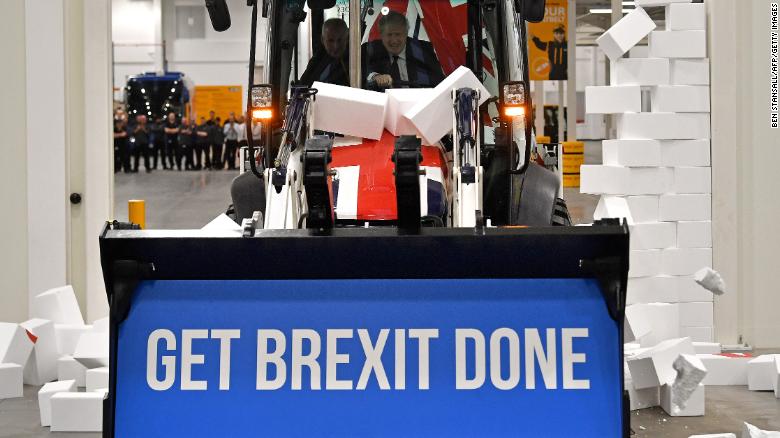London (CNN)On December 12, 2019, Boris Johnson fulfilled his destiny.
After
three years of political deadlock had failed to deliver on the UK's
vote to leave the European Union, the figurehead of Brexit won a landslide general election, giving him a parliamentary majority large enough to reshape the nation.
Brexit's true believers celebrated: Their messiah would now be able to finish the job he had started in 2016.
Johnson
had seemingly unified a bitterly divided Conservative party -- whose
days in government during Theresa May's premiership had appeared
numbered just months before. The good will Johnson's lawmakers held for
their leader was palpable.
A scant 12 months later, much of that goodwill has vanished -- despite his party continuing to perform well in opinion polls compared to the opposition Labour Party.
The Brexiteers who celebrated Johnson's victory now fear a sell-out at the last minute, as the deadline for a deal with the EU could come as soon as this Sunday.
And
while Johnson's handling of the Covid-19 pandemic has been heavily
criticized as insufficient and dangerous by his opponents, many in the
UK Prime Minister's own party believe he has gone too far, seeing his
readiness to batter the economy with lockdowns, restrictions and
taxpayer-funded bailouts as a betrayal of Conservative values.
For
the purposes of this article, CNN spoke with multiple figures within
the Conservative party, from Members of Parliament to former advisers
and campaigners. Most agreed to speak on the condition of anonymity, in
order that they could be candid about what they perceive as the failures
of their leader.
More than
20 Conservative sources across the party believe a significant catalyst
for the gulf in trust between the PM and his party was the decision to
hire Dominic Cummings -- the controversial brains behind the Brexit
campaign led by Johnson -- to serve as his most senior adviser. They
believed Cummings was a ticking timebomb whose unpredictability would
inevitably land the PM in trouble. And although Cummings has resigned
from his post and will no longer work for Johnson in the new year, many
fear the damage has been done.
Cummings was not a member of the party and, during the Brexit campaign, had made his contempt for Conservatives very clear.
Veteran
MPs bit their tongues as Cummings' campaigning racked up victories in
both the Brexit referendum and the 2019 general election, but when
Johnson returned to Downing Street with a majority, his party's rank and
file members believed they were being treated as an afterthought by a
leader who felt invincible.
"There
was a real feeling among MPs that they no longer mattered," says Tim
Bale, professor of politics at Queen Mary, University of London. "The
decisions were being made by a small group of people in Downing Street
and they were simply expected to shut up, fall in line and defend the
government no matter what."
This
created problems when controversy began to swirl around Cummings. Over
the course of 2020, the PM's top aide made headlines on two significant
occasions.
First came the revelation that he had personally hired someone to work in Downing Street who had supported eugenics and made racist remarks.
Then,
even as millions of Britons up and down the country were spending
months largely confined to their homes because of the coronavirus
pandemic, Cummings broke lockdown regulations to drive his wife and son from London to the northeast of England, shortly after an outbreak of Covid-19 in Downing Street.
The
story rumbled on for months and polling repeatedly revealed that the
public thought Johnson had made a mistake in not sacking Cummings, and
muddied the government's coronavirus message. Even now, it is a stain on
the PM's reputation.
"We
were being asked to defend a man who most of us had never met, and
whose behavior had led to us getting hundreds of letters from angry
constituents," said one Conservative MP who is on the government
payroll.
Another senior
Conservative MP said they were "being pressured to repeat lines fed to
us by Downing Street, without so much as a word of thanks or contrition
from Dominic."
Cummings
defended his decision to leave London during the lockdown at a press
conference held in the back garden of Downing Street, saying he believed
it was the best way to provide childcare for his young son.
If
defending the behavior of Cummings wasn't bad enough, dozens of MPs
told CNN that on more than one occasion during 2020 they were instructed
to explain unpopular government policies, only for Downing Street to
U-turn moments later.
"You can
almost feel that the trust has gone," said the senior Conservative MP.
"Colleagues in parliament are increasingly hesitant to make any public
statement supporting the government, because we have no idea how long a
policy will stick."
The worst example of this
came when popular Manchester United footballer Marcus Rashford pleaded
with the government to provide free school meals for the poorest
children over the holiday period. After days insisting their initial
plan not to offer food vouchers was correct, Downing Street eventually
gave in to public pressure.
"There
are only so many times you can be expected to defend the indefensible,
only to have the government pull the rug out from under you," says Bale.

Boris Johnson gives a virtual news conference last month, while self-isolating during the Covid-19 pandemic.






0 Comments